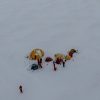
A refugee settlement in eastern Sudan where families are fleeing to as civil war erupts in neighbouring Ethiopia
Credit: Joost Bastmeijer
Yared was trying to escape a government assault on his hometown in northern Ethiopia with his children when he saw the bodies on the road.
“I saw one lady. She was lying on the ground. She was dead," the 35-year-old driver said, describing her two children lying beside her body. "One was about seven years old, but he was also dead. They were killed by a bomb. The other one was a baby. He was trying to breastfeed from her,” he said.
He added: “The baby was crying and trying to get milk from her breast. When people tried to take the child away, there was a mixture of blood and milk in his mouth.”
Yared breaks down into tears when he explains that his mother was also killed by one of the explosions. “Bombs were coming from everywhere. As we tried to escape, there were people with knives and swords.”
The Telegraph has spoken to more than a dozen refugees from Humera town in Ethiopia’s northern Tigray region, who fled across the border into two refugee camps in the parched wasteland of eastern Sudan.
Humera, a town of about 30,000 which borders both Sudan and Eritrea, was one of the first places to be attacked when Ethiopia’s Nobel Peace Prize-winning Prime Minister Abiy Ahmed sent his powerful federal military into Tigray to oust the region’s leaders, the Tigrayan People’s Liberation Front (TPLF), on November 4.
Ethiopia locator map
The refugees all described being bombarded for several days by indiscriminate artillery shelling and rocket fire coming from the border with Eritrea. They also say they were attacked by knife-wielding militiamen from the neighbouring Amhara region, who had joined forces with federal troops and cut people to death as they tried to escape.
Since the civil war started to rage across the mountainous region of Africa’s second-most populous nation, tens of thousands of refugees have fled into neighbouring Sudan and thousands have likely died.
“It was very, very bad. The soldiers of Abiy Ahmed didn’t differentiate between people. They crushed all the people. It is like a genocide,” said Zenebe, a young ethnic Tigrayan man from Humera. “They didn’t only use guns; they used knives. They used big weapons. So many big weapons [shooting] from Eritrea.”

A family sits under a thorny acacia tree on one of the rolling hills that surround Um-Rakoba, a refugee camp that was built to host refugees fleeing the Marxist Derg regime in 1985
Credit: Joost Bastmeijer
The TPLF claims Eritrea is involved in fighting on the side of government forces, which Ethiopia denies.
Gidey, a Tigrayan woman who walked into Sudan with her five children, said she saw people executed in Humera by occupying forces.
“I saw soldiers kill a taxi man and the two people in the taxi because there was a poster of the Tigrayan president in the car. They asked for gold. They said: ‘If you don’t give me gold, we will kill you’. They shot the driver in the chest,” she said, her voice hoarse with anger.
“There were some days of heavy shelling before I fled. Then the Amharic militias came into the town. There were bodies everywhere in the streets,” says one student who was meant to graduate this year but had to flee with just a list of his relative’s phone numbers.
“It is worse than the Derg,” the young man said, referring to Ethiopia’s ruthless Marxist dictatorship which killed thousands in the 1980s.
All the refugees The Telegraph spoke to said they had seen bodies lying in the streets of Humera. One man said he had seen more than twenty bodies, some killed with knives, others by guns and shelling.
Because of a communication blackout in the Tigray region, it is difficult to verify the refugees’ claims independently. People told The Telegraph that about a week before the fighting began the government shut the power off, meaning no one had any battery on their mobile phones to record the assault.
However, some of The Telegraph’s accounts of bombardment have been corroborated by an AFP reporter who gained access to Humera with Ethiopian government minders.
AFP reported two burnt-out tanks at the entrance of the town, streets lined with rubble and buildings "peppered with bullet holes and gouged by shrapnel". The reporter was not allowed to visit a local hospital to get an accurate picture of the number of dead or injured.
The Ethiopian army declared Humera “liberated” on November 12 and the military is now believed to be advancing on Mekele, Tigray’s capital.
On Sunday, a spokesperson for the Ethiopian Federal Army told state media that they were about to surround the city with tanks and artillery. “We want to send a message to the public in Mekele to save yourselves from any artillery attacks and free yourselves from the junta,” Colonel Dejene Tsegaye said.
Shortly after the announcement, Prime Minister Abiy Ahmed – a man who last year told attendees of the Nobel Peace Prize award ceremony that "war is the epitome of hell" – wrote on Twitter that: “We urge you to surrender peacefully within 72 hours, recognising that you are at the point of no return.”
The news that Mekele might soon be shelled has alarmed international observers. A full-scale attack on the city of 500,000 by federal forces would have catastrophic humanitarian consequences.
Human Rights Watch (HRW), a rights body based in New York, said that this threat of firing artillery on a populated area could violate international law. “Treating a whole city as a military target would not only be unlawful, it could also be considered a form of collective punishment,” their Horn of Africa Director, Laetitia Bader, tweeted on Sunday.
“In other words, war crimes,” said Susan Rice, former US national security adviser.
Many of the refugees from Humera who spoke to The Telegraph had just arrived at Um-Rakoba camp in eastern Sudan. From 1985 to 2000, the rugged desert land was filled with tales of people who fled Ethiopia’s famine and the Derg. Last week, the camp reopened for the thousands flooding in.

A few hours after this photo was taken, another 1,000 refugees arrived in the Um-Rakoba camp by bus
Credit: Joost Bastmeijer
More than 6,300 people have arrived there in the past two weeks. All the infrastructure which was there before is gone, so in 40C heat men and women have set about constructing tents out of tarpaulins. On Sunday, another convoy of almost 900 men, women and children were on their way to the camp in a convoy of trucks.
"I am very sad to see people here again," said the camp’s manager Abdelbasit Abdelghani, who helped close the camp twenty years ago.
Under one of the hastily constructed cloth shelters, a young man called Teame sits in a blue denim shirt, a small silver cross around his neck. The young man cannot find his five-month pregnant wife and says he has not slept in ten days.
“I saw two of my friends killed by guns. My wife – where is she now? I don’t know,” he said, nervously fiddling with a pack of cheap Sudanese cigarettes. “I need a psychiatrist. My mind is disturbing me so much. I see images of my dead friends, of my wife, in my dreams. After that, I can’t sleep anymore.”























































Свежие комментарии